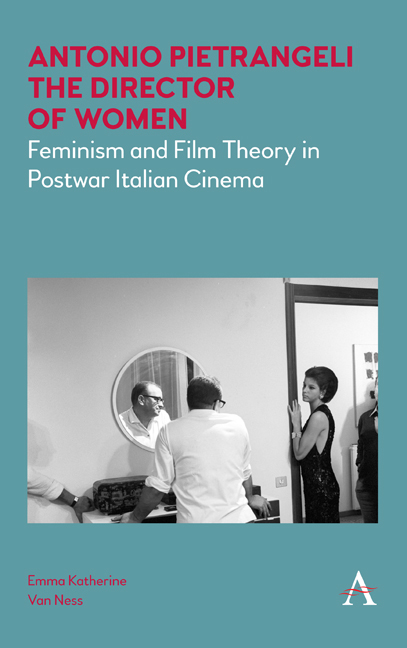Book contents
- Frontmatter
- Dedication
- Contents
- List of Illustrations
- Acknowledgments
- Vita
- Introduction: Antonio Pietrangeli, A Brief History
- Chapter 1 Pietrangelian Film Theory: From Neorealism to Feminism
- Chapter 2 Maid from the Margins: Il sole negli occhi
- Chapter 3 The Coming of Age of a Teenage Bride: Nata di marzo
- Chapter 4 Legally Bound: Political Realism and Prostitution in Adua e le compagne
- Chapter 5 Fantasmi a Roma: Sur-Realism and the Time-Image
- Chapter 6 The Dora Problem: La parmigiana, Piatti, Pietrangeli and Freud
- Chapter 7 Too Much Woman: Marriage, Power, and Excess in La visita
- Chapter 8 Breaking Faith: Il magnifico cornuto, Envy and the Crisis of Vision
- Chapter 9 Io la conoscevo bene … Or did I? Antonio Pietrangeli, the Author and the Actress
- Conclusion: Antonio Pietrangeli, Feminism and Film Theory
- Bibliography
- Index
Chapter 3 - The Coming of Age of a Teenage Bride: Nata di marzo
Published online by Cambridge University Press: 06 May 2020
- Frontmatter
- Dedication
- Contents
- List of Illustrations
- Acknowledgments
- Vita
- Introduction: Antonio Pietrangeli, A Brief History
- Chapter 1 Pietrangelian Film Theory: From Neorealism to Feminism
- Chapter 2 Maid from the Margins: Il sole negli occhi
- Chapter 3 The Coming of Age of a Teenage Bride: Nata di marzo
- Chapter 4 Legally Bound: Political Realism and Prostitution in Adua e le compagne
- Chapter 5 Fantasmi a Roma: Sur-Realism and the Time-Image
- Chapter 6 The Dora Problem: La parmigiana, Piatti, Pietrangeli and Freud
- Chapter 7 Too Much Woman: Marriage, Power, and Excess in La visita
- Chapter 8 Breaking Faith: Il magnifico cornuto, Envy and the Crisis of Vision
- Chapter 9 Io la conoscevo bene … Or did I? Antonio Pietrangeli, the Author and the Actress
- Conclusion: Antonio Pietrangeli, Feminism and Film Theory
- Bibliography
- Index
Summary
Producing the Couple, but Not the Happy Ending
Between 1953 and 1958, Pietrangeli directs two full-length feature film, Lo scapolo (1955), starring Alberto Sordi, and Souvenir d’Italie (1957), as well as and one episode in Amori di mezzo secolo entitled Girandola 1910. These films are briefly discussed in the conclusion, a formal choice based on my intention to focus on Pietrangeli's difference. These films, coming at the beginning of his career, show Pietrangeli wrestling with conventions; Lo scapolo, for example, is considered by many the film that most comfortably fits into the Comedy Italian Style genre due to its male protagonist and star, Alberto Sordi. Like Nata di marzo, Pietrangeli with Lo scapolo investigates and criticizes cultural tropes about the economic and social issues surrounding marriage, albeit from a male, not a female, perspective.
With Nata di marzo (1958), Pietrangeli returns to the trope of problematizing marriage from a female perspective as he did in his first film, Il sole negli occhi (1953), but from a very different economic class. The title of Pietrangeli's fourth full-length film begins with a past participle, nata, or “born,” that clues the viewer immediately into a quality key to Francesca’s, the protagonist’s, characterization, how she was born. She is born wealthy, born carefree, born capricious. To briefly summarize the plot of the film, Francesca (Jacqueline Sassard), a young, wealthy Milanese girl, falls in love with Sandro (Gabriele Ferzetti), an architect, and she manipulates her way into a marriage that she ultimately finds stifling and unsatisfying. Throughout the film, she acts as a self-conscious narrator, diegetically confessing her errors and her missteps to her friend Carlo and extra-diegetically, to us, the spectators, who experience her marriage and its dissolution through flashback and voice-over narration. This reliable guide through the narrative is a more mature, wiser version of Francesca.
While those “born in March” are said to be variable in nature, and Francesca is described by Antonio Maraldi as “spoiled, a liar, capricious, windy, and unstable,” the core conflict of the film itself centers not around Francesca's character, but around Francesca's youth and inexperience, exacerbated, of course, by her innate characteristics.
- Type
- Chapter
- Information
- Antonio Pietrangeli, The Director of WomenFeminism and Film Theory in Postwar Italian Cinema, pp. 57 - 82Publisher: Anthem PressPrint publication year: 2020



